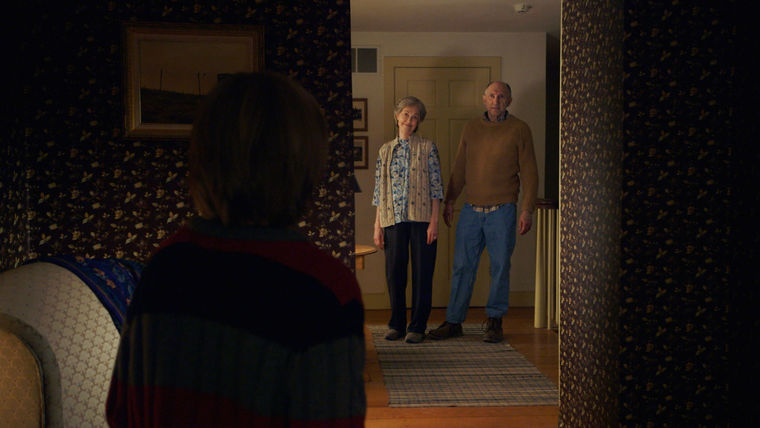
The Visit (2015) / Horror-Comedy
MPAA Rated: PG-13 for disturbing thematic material including terror, violence and some nudity, and for brief language
Running Time: 94 min.Cast: Olivia DeJonge, Ed Oxenbould, Deanna Dunagan, Peter McRobbie, Kathryn Hahn
Director: M. Night Shyamalan
Screenplay: M. Night Shyamalan
Review published September 12, 2015
 Sporadically
effective as a black comedy but a bit too this to be a satisfying horror movie, The Visit is a low-budget
attempt by M. Night Shyamalan to "start over" in trying to build up
his reputation back to former glory with something fresh and
unexpected. His last two films, After Earth and The Last Airbender,
were commercial and critical flops (though I didn't really mind
either), so what's different here is that he is working with no stars
(i.e., no egos other than his own), and the most limited resources of
his career (reportedly, a $5 million production budget that he funded
himself). The Visit plays more for light amusement that horrific
scares, though there is a sense of creepiness that pervades a few
scenes. It's only because some of his more recent efforts have been
deemed so awful (especially The Happening) that anyone would label the
anemic entertainment value of The Visit as a sign of a comeback.
Sporadically
effective as a black comedy but a bit too this to be a satisfying horror movie, The Visit is a low-budget
attempt by M. Night Shyamalan to "start over" in trying to build up
his reputation back to former glory with something fresh and
unexpected. His last two films, After Earth and The Last Airbender,
were commercial and critical flops (though I didn't really mind
either), so what's different here is that he is working with no stars
(i.e., no egos other than his own), and the most limited resources of
his career (reportedly, a $5 million production budget that he funded
himself). The Visit plays more for light amusement that horrific
scares, though there is a sense of creepiness that pervades a few
scenes. It's only because some of his more recent efforts have been
deemed so awful (especially The Happening) that anyone would label the
anemic entertainment value of The Visit as a sign of a comeback.